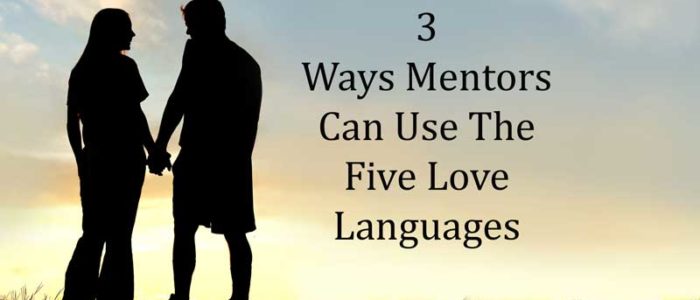3 Ways Mentors Can Use the 5 Love Languages
How Mentors Can Use the 5 Love Languages to Improve Connection
When we teach our course for marriages that are struggling, we always talk about the Five Love Languages by Gary Chapman. We do this very early in the course and then we cover a lot more material.
Gary Chapman came out with his book over 20 years ago. Most, but not all, couples are familiar with it. This includes couples that aren’t very happy in their relationships.
Yet, in our course evaluations, we will ask what was most valuable. Inevitably, someone will write that the Five Love Languages was very impactful.
It works for many couples!
We have three ways to use the 5 Love Languages when you mentor.
Create Curiosity
When we introduce the languages, people naturally go to what their love language is. What’s my love language? What’s yours?
Many couples don’t know what their spouse’s love language is. Those couples that do know often haven’t thought about their own actions to demonstrate and show love.
People love assessments and surveys. We suggest that they go to the 5 Love Language website and take the assessment.
It also opens up the dialog that it is OK for people to have different approaches to their needs. What works for one person, doesn’t work for the other.
Bringing up the 5 Love Languages creates curiosity.
Change the Conversation
We use the 5 Love Languages to change the conversation. Instead of focusing on blame and what the other person isn’t doing, we want to focus on how to build connection.
The great thing is that it changes the dialog to what shows love. Couples start to focus on how the specific actions each could take that would be meaningful.
Laura and Tom told us about how this helped them to change the conversation. Laura’s love language was words of affirmation. She didn’t feel that she was given much affirmation and she had turned very critical of her husband. The week after hearing our talk, Laura was making dinner. She ran out of milk. Tom jumped up and said he’d go to the store. As he drove away, Laura realized that Tom was always doing those things. Laura realized that Tom was showing love with acts of service. She thought back over their 20 years of marriage and she realized that Tom was expressing love to her, but she never heard it.
Laura and Tom’s experience changed their attitudes. They realized that they needed to work on actions that would show love. They also realized that they had misjudged each other’s intent. They need to give their partner credit for the intent, even when they didn’t do it well. Laura realized her husband did love her.
It changed their conversation.
Focus on Specific Actions
I like using the Five Love Languages because it allows you, as a mentor, to talk about specific actions that show love. The action steps can get very practical.
Since the dialog focuses on what each person’s love language is, it works both ways. How can each of them work to show each other love in practical ways?
We often have couples take this down to a detailed level. If your love language is affirmation, what makes something affirming? When isn’t it affirming? Are there particular times that you feel affirmed? Specific areas?
We’ll ask couples to be sure that they recognize when their partner does it right. Your spouse may not know when they are doing something well. We explain that your partner needs a feedback mechanism to know when it’s working.
We have found this to be a great way to help couples create more positive interactions that build their bond. I like it because it gets very practical.
Tips:
- Create Curiosity – Ask them if they know their love language. Encourage them to take the assessment.
- Change the Conversation – Change the conversation away from blame to what will build their bond. Ask for detailed actions that demonstrate love.
- Set Goals with Specific Actions – Set up goals on how each of them will do something specific to show love.
What do you do to help couples set up practical steps to build their connection?





Thank you for sharing the link to the 5 love languages assessment. I love the book. I wasn’t aware that there is an online assessment. Thank you again.
Yes! Check out the 5 Love Languages website!
If you were lucky enough to have someone who helped you along the way, then you know firsthand the value of mentoring.